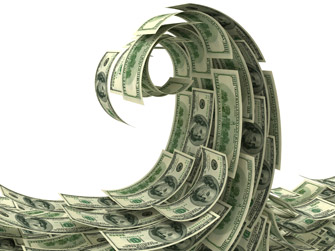 In his book, “The Ascent of Money”, Niall Ferguson documents a financial history of the world. Ferguson contends that finance is the foundation of human progress and maintains that financial history is the “essential back-story behind all history.”
In his book, “The Ascent of Money”, Niall Ferguson documents a financial history of the world. Ferguson contends that finance is the foundation of human progress and maintains that financial history is the “essential back-story behind all history.”
“The evolution of credit and debt was as important as any technological innovation in the rise of civilization, from ancient Babylon to the silver mines of Bolivia,” Ferguson states. “Banks provided the material basis for the splendor of the Italian Renaissance, while the bond market was the decisive factor in conflicts from the Seven Year’s War to the American Civil War.”
Ferguson goes on to aptly point out perhaps the most salient financial factoid of all: “Yet the most important lesson of financial history is that sooner or later every bubble bursts; sooner or later the bearish sellers outnumber the bullish buyers; sooner or later greed flips into fear.”
If, as history demonstrates, financial markets are indelibly subject to such boom-and-bust cyclicality, and if the tone of our culture is so integrated into the economic state, why must we suffer so?
Why have we not evolved to the point where we have at least minimized the potential for massive financial catastrophe?
Why, in 2009, did the threat of another Great Depression, poised to surpass that of the previous Depression in the 1930s, seem like such a possible reality?
Why do we make the same mistakes?
Could it be that our economic theorists and philosophers are so misguided and myopic in their speculations?
In his essay (“Beyond the Pleasure Principle,” 1920) Sigmund Freud contended that people repeat traumatic events over and over again. This type of re-living represents an attempt at mastery and control. According to neo-Freudians, corrective emotional experiences can repair the trauma.
History keeps repeating itself in an effort to learn from mistakes and correct events in order to achieve stability and security. And yet, if we do not learn from our mistakes, there is obviously a masochistic element to this process.
On Wall Street, it appears that the envelop is always pushed to its bursting point, because people want to squeeze the most out of any product or service in order to maximize profit and gain, thereby threatening the elasticity of the actual membrane of any bubble.
My purpose with this book is not to dispel, nor even to debate, the concepts of Ferguson, Freud, or any other authority. Both my practice and my prose are aimed at enabling the individual to cope with crisis, survive, and grow.
To do that, I seek to enlighten the reader to re-examine key concepts, not from financial or economic perspectives, but through the lens of psychology and, to an extent, sociology.
When you learn to look at the psychological factors and influences behind market machinations, you have a more comprehensive knowledge base from which to draw informed conclusions.